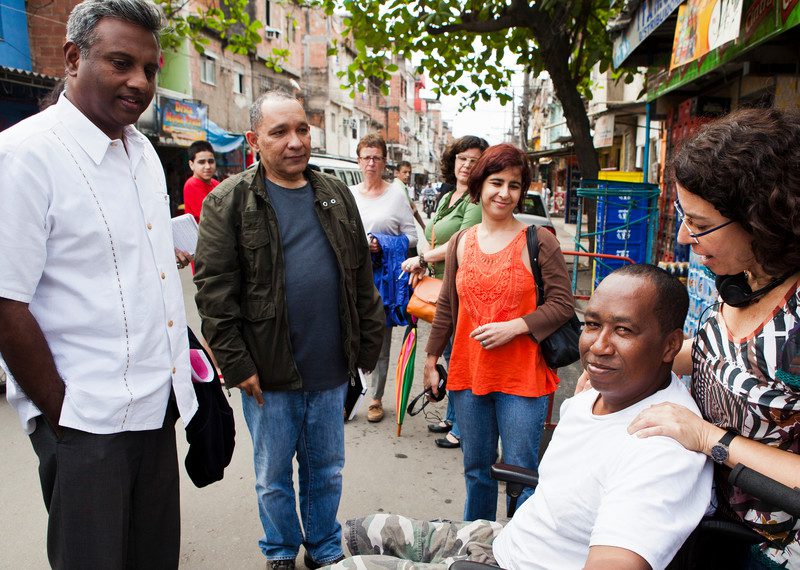One of several community leaders I met with today said it best, “Impunity is the mother of all violence.” I was listening to people from Maré speak about their experiences living in Rio de Janerio’s largest favela. They spoke of intertwined communities that have been established in Rio as long as their more famed sisters – Copacabana, Ipanema and Leblon.
But their stories were not of beautiful beaches, famed dance clubs or glamorous bars and restaurants. Their stories were of working class Brazilians trying to survive the twin threats of violence at the hands of criminals, and indifference or violence by the police. One issue they raised was the lack of electricity, water, sanitation, good schools and health clinics. But even when talking about the failure of the government to ensure these crucial services, the conversation kept coming back to security.Favelas such as Maré have very high rates of violence. In the past this has meant that the police, and parts of the government, have largely abandoned people living in the favelas. They would explain that they were too violence for them to work in.
This is changing, but when listening to the people of Maré discuss what is soon going to happen in their communities, their fear is palpable. Partly spurred by the upcoming role of Rio de Janerio as host to both the World Cup and the Olympics, the police are undertaking a program of “pacification”.

The problem is the history of the police treating the people living in the favelas as if they are all criminals. Far too many deaths in favelas – particularly of young, black men and boys – appear to be at the hands of the police.
In late June a peaceful protest ended with the people of Maré in a usual predicament: targeted by criminal gangs as they protested and caught in the crossfire of police who used deadly force. It ended with the killing of 10 people, including one police officer.
This brings us back to the point made by the community leader at our meeting – proper investigations into use of force by the police are rare. Credible allegations that the police are engaged in numerous extrajudicial executions are virtually ignored and witnesses are too afraid to come forward.
The hardworking people of Maré deserve to live with a sense of security in their lives: whether that is the security of knowing they can walk to the store to buy a loaf of bread without being killed; or that their children can go to school and get a decent education; or that the garbage will be collected and the streets maintained.
Today they live with no security. Criminal gangs continue to make life miserable for the residents of the favela. The government ignores its obligations to provide basic services. And, most damning, is that the police – rather than being the providers of security – provoke fear in the guts of people living in Maré.
As part of their intermittent interventions the police engage in arbitrary frisks without cause. They routinely invade people’s homes without a search warrant, destroy what they don’t want, confiscate that which may be of value and too often threaten or beat the residents. People count themselves lucky when such “home invasions” only result in a broken door, smashed furniture and stolen property.
This concept of “security” being implemented through the “pacification” program is seriously flawed. The police “profile” virtually all residents of the favelas as de facto criminals. If an individual challenges the police, that becomes evidence that they are criminal and typically results in a confrontation, which in too many cases leaves young men dead.
As devastating as it was to hear these stories on my first day of this trip to Brazil, there was also reason for hope. The meeting with community leaders and members was organized by Redes de Maré and the Observatório das Favelas who are working closely with Amnesty International’s office in Brazil on a campaign to empower residents of the favela to challenge the police and enable them to claim their rights.
Two elements of this campaign are proving to be critically important. The first is to ensure that people living in Maré understand their rights if they are stopped on the street or the police come to search their homes. The knowledge that the police must have a warrant to search your home makes its easier for residents to assert their rights.
The second, and more crucial, element is the discussions we are holding with the police to help them recognize that someone who knows and asserts his or her rights is claiming the rights of citizenship, not acting like a criminal.
Progress is happening, but it is slow. Stickers affixed to doors and windows – asking the police to ensure that before they enter a home they check that the search is lawful – have been torn down by the police. And there is still fear about the upcoming pacification program, which will include bringing tanks to the streets of Maré.
But residents of the favelas – strengthened by their knowledge of their rights, and better able to engage with government officials, including the police – are slowly challenging the perception that all people living in slums are criminals. The police are beginning to recognize that their actions – lawful and otherwise, based on a sweeping judgment of people living in poverty – has exacerbated, not reduced, violence in the favelas.
The partnership of Amnesty International and the two community based organizations has made this possible. People in Maré trust the Observatório and Redes because they are of the community. They are learning to trust Amnesty International, because we are using our influence to bring key government and policing officials to the table to hear directly from people living in Maré, who bear the brunt of violent crime and policing with violence.


